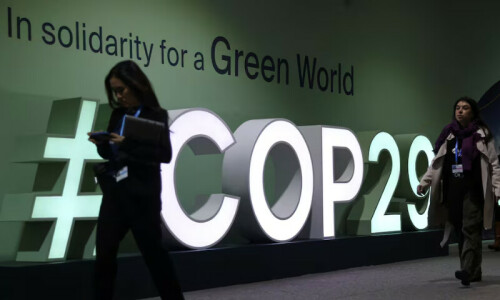KARACHI: The Sindh Assembly was told on Wednesday that the provincial government had no intention to privatise the Karachi Water and Sewerage Board as it was against the policies of the ruling Pakistan Peoples Party.
“We are neither privatising the Water Board [KWSB] nor will we allow anyone to do this,” said Saleem Baloch, parliamentary secretary for local government, while responding to a calling-attention notice moved by Abdul Rasheed, the Muttahida Majlis-i-Amal’s sole member in the house.
“Pakistan Peoples Party is a staunch opponent to the idea of privatisation; how can we do something that we have always opposed so openly?” said Mr Baloch during the proceedings presided over by Speaker Siraj Durrani.
Mr Rasheed referred to certain media reports while presenting his calling-attention notice and sought explanation from the provincial government to shed light on the claims in those reports suggesting the Sindh government was considering privatisation of the KWSB.
“Such reports have augmented the concerns of the people of Karachi who are already receiving deficient supplies of water,” he said.
He said the KWSB’s privatisation would certainly create concerns in the people as they had endured the consequences of the privatisation of the erstwhile Karachi Electric Supply Corporation.
‘How can we do something that we have always opposed so openly?’
The parliamentary secretary said the government, instead, had decided to introduce reforms in the structure of the KWSB to improve its performance that had not been satisfactory so far.
“Our aim is to improve the service delivery by the KWSB for which a detailed strategy has been chalked out,” said Mr Baloch.
Information Minister Saeed Ghani, who had been local government minister previously, echoed similar sentiments.
“Neither would we privatise the KWSB, nor have we made any such plans for it.”
He said certain elements had spread rumours that had perturbed the people as well as the staff at the KWSB.
Muttahida Qaumi Movement-Pakistan’s Ra’na Ansar withdrew her calling-attention notice as she expressed her satisfaction over the policy statement furnished by Mr Ghani a day earlier vis-à-vis the alleged ‘stoning to death’ incident of a 10-year-old girl in the mountains of Dadu.
She thanked the minister for offering a detailed statement in the house, adding that the government should make efforts to ensure children were protected in the province.
Teachers’ scrutiny
Responding to another notice given by the Grand Democratic Alliance’s Nusrat Sehar Abbasi, Culture Minister Sardar Shah, on behalf of the chief minister, said scrutiny of the teachers who had passed the NTS tests was going on before regularising their services.
He said those teachers had been recruited in the previous tenure of the PPP government after they passed the NTS test. He said the government had already regularised 1,680 teachers while those who passed Iqra test had also been regularised.
Ms Abbasi said the government had not regularised those teachers despite getting a law passed for their regularisation from the Sindh Assembly in 2015.
She criticised the provincial authorities for resorting to baton charge against the teachers who were peacefully protesting for the acceptance of their demands.
She said the Sindh government had double standard vis-à-vis regularisation of teachers as it had regularised those belonging to Karachi while the teachers from Hyderabad were being ignored.
Minister Shah said teachers had the responsibility of structuring a society and it was not befitting for them to violate the law. He added that the law enforcement agencies would act if anyone tried to create a law and order situation. He assured the house that the issue would be settled soon.
Schools in bad condition
Pakistan Tehreek-i-Insaf’s Shahnawaz Jadoon informed the house about the dilapidated conditions of schools in his constituency — Keamari, Machhar Colony, Sultanabad and Salehabad.
“Schools in these areas lack furniture and other basic facilities. The school buildings are in poor condition.”
He claimed the condition of schools in Sindh was worse than the schools being run in the PTI-ruled Khyber Pakhtunkhwa.
Minister Shah challenged the PTI lawmaker’s claim, saying the latter’s party held sway over the KP and Punjab, and both provinces were “way behind” Sindh concerning indicators on education. He said more than 12.5 million children were out of school in Punjab alone.
“I request the opposition members to indicate such problems to our government instead of going for rhetoric and criticism for the sake of criticism.”
He said the government in Sindh was committed to its resolve to provide education to every child in the province irrespective of whether a school was located in the constituency of treasury or opposition members.
“It is our duty to improve our education system and we are here to act if you guide us about such improvements.”
The PTI’s Jamal Siddiqui claimed in his calling-attention notice that the Beaconhouse School was still taking advance fee from students, which was a violation of the Sindh Private Education Institutions (Regulation and Control) Rules, 2005 as well as contempt of the apex court’s orders.
Mr Shah said registration of a number of schools had been cancelled by the provincial government for the first time for being involved in such violations. He said the department would take action if a formal complaint was submitted to it.
Speaker Durrani said most such schools were being run as an industry and not as the place to impart education.
“I also have concerns over these schools,” said the speaker.
Later, the chair announced assent to four bills by the governor. The bills are: The Provincial Motor Vehicles (Amendment) Bill, 2019, The Sindh Institute of Ophthalmology and Visual Sciences (Amendment) Bill, 2019, The Sindh Reproductive Healthcare Rights Bill, 2019 and The Sindh Charities Registration and Regulation Bill, 2019.
The performance audit report on car parking structure, Lines Area, Karachi, March 2015-16, was also laid.
Published in Dawn, December 12th, 2019














































